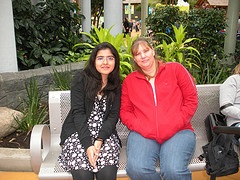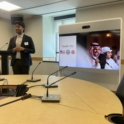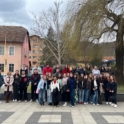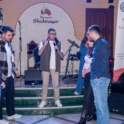Abdulaziz reflects on the highlights from serving as a mentor for CEW.
STORIES
Bridging the Pakistan-American Divide

Written by YES participant, Komal Ali.
Like many summer mornings, I forced myself out of bed, reluctantly went downstairs for breakfast, and settled listlessly on the couch. This morning, my eyes hovered onto a package stating, ‘From Minnesota.’ Instantly, a wide grin replaced all lingering slumber. Out of excitement, I literally tore open the packaging and opened the box to find many birthday gifts from Minnesota, United States. The gifts, bags of Hot Flamin’ Cheeto’s, chocolates, clothes, shoes, and more, were sent by my affectionate host family in the United States.
On the evening of August 4th 2008, I boarded my flight to the United States as an exchange student of the Kennedy-Lugar Youth and Exchange Study Program. As I recited the Islamic prayer for travel, apprehension about Americans occupied my heart and brain. Sixty other Pakistani exchange students sitting on the same flight shared similar feelings of apprehension and bewilderment.
Most of us only knew a few things about the United States and its people; namely, that Americans love war and hate Pakistanis because they assumed we were all terrorists. I imagined getting bullied by a gang of students because of my religious background or nationality, and my soul wrenched with fear. However, my apprehensions were proven baseless the moment my lovely host family, the Swedbergs, warmly opened the doors to their house and hearts.
During the ten months I spent with the Swedbergs, I realized how we unintentionally fall for stereotypes. After reading street graffiti in Karachi reflecting enmity for America, I also came to believe that all Americans were evil and want wars with Muslim countries. Perhaps that’s how most Pakistani teenagers think since there is minimal awareness about average American in the media. Mostly, all we view on news channels are American Senators or Congress members talking about drones and wars.
This all changed while I celebrated Eid and Ramadan with my American host family and friends. I learned that none of them had any issues with my religious practices. My host mom routinely drove me to a nearby Mosque for Friday prayers and sometimes my friends fasted with me during Ramadan to show acceptance and reverence towards my beliefs. In the last ten days of Ramadan, few friends visited a Mosque with me. While I prayed and listened to the Friday sermon, my friends quietly observed the mosque culture. Later, they told me it was an exceptional experience for them to see all Muslims calmly praying; that was not the images that their media gave about Islam.
Just like they visited my Mosque, I sometimes attended Church ceremonies with them. Together, we celebrated Christmas, Thanksgiving, and Easter. I gratefully came to the realization that America has more to its culture than the infamous images of pre-marital sex and high divorce rates.
Anne and Dar, my host parents, never made me feel alone or treated me like a foreigner. Every day was a happy day; by the end of my stay there, my emotional attachment to the Swedbergs and my friends had invariably increased. As the time to say farewell inched closer, my heart sunk with dread of never being able to see them again. They say, all good things come to an end, and so did my exchange year. With tears streaming down our faces, we waved goodbye to each other.
However, the relationships didn’t break. To this day, regardless of the mounting US-American tension, we relish the same bond. I have finally concluded that governments and people of countries innumerably vary from each other. If I hadn’t come to know average Americans so closely, I wouldn’t have realized that average Americans are barely aware about Pakistan and Pakistanis to harbor any resentment against us; just as average Pakistanis are busy earning to make the ends meet than to pay attention to the whereabouts of Osama Bin Laden.
Perhaps it’s about time everyone in this world quits being stereotypical and judgmental without firsthand knowledge. There are bad apples everywhere; however, just because of them an entire nation or entity shouldn’t be seen with a hypercritical lens.





